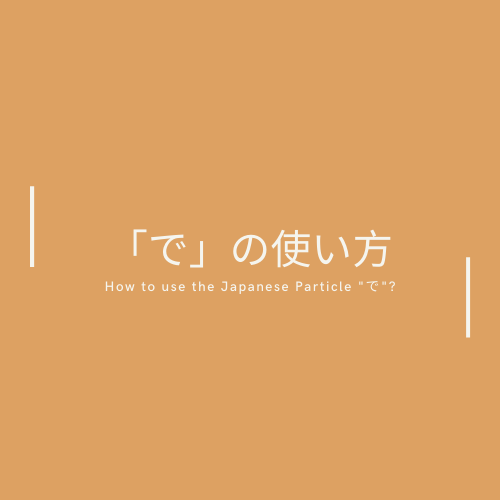What does "で" mean? How to use the Japanese Particle "で"? Can で mean "and"? - N5 grammar in detail
Copyright Notice: This article is an original work licensed under the CC 4.0 BY-NC-ND license.
If you wish to repost this article, please include the original source link and this copyright notice.
Source link: https://v2know.com/article/572

In Japanese, there are many uses of "で". In this sentence, it means this, but in another sentence, it means that. The use of "で" has bothered many Japanese beginners. To master the usage of "で" well, we need to summarize the usage of "で". The following is my summary, come and take a look!
1. Show place
Formula:Place+で
Examples:
- 学校で勉強する。learning in school.
- 私は大阪で五年過ごした。I have lived in Osaka for 5 years.
2. By/With/On ... a certain way to do something
Formula:Method+で
Examples:
- ペンで書く。Write with a pen.
- 船で行く。Go by boat.
- その事件をテレビで知った。I learned about the incident on TV.
3. Be made of/from
Formula:Raw materials+で
Examples:
- このテーブルは木で作られています。This table is made of wood.
- 日本酒は米で作る。Sake is made from rice.
4. Time or Age
Formula:Time/Age+で
Examples:
- 会社は五時で終わります。The company ends at five o'clock.
- 彼は二十七歳で結婚した。He got married at the age of twenty-seven.
5. Show reason
Formula:Reason+で
Examples:
- 病気で休む。Rest due to illness.
- 受験(じゅけん)準備で忙しい。Because preparing for the exam,I am very busy.
6. Deadline, limitation
Formula:Deadline/Limitation+で
Examples:
- 1000円で買った。I bought it for 1,000 yen.
- 申し込みは明日で締め切る。Registration ends tomorrow.
Here is a special explanation of the first sentence, "1,000 yen" here is just to express the meaning that I bought it for only 1,000 yen. So this is a "Limitation". Means "no more than 1,000 yen".
7. Status (Is doing something/Is In a certain state)
Formula:Status+で
Examples:
- 若夫婦で暮らしている。Young couple living together.
- 大声で叫んでいる。Screaming out loud.
8. According to
Formula:According to what+で
Examples:
- 時間で雇う。Hire according to time.
- 外見で人を判断する。Judge people by appearance.
9. The range of comparison
Formula:Range+で
Examples:
- 中国では、北京大学が一番有名です。Peking University is the most famous in China.
- 私達のクラスでは、李さんが最も真面目です。Lee is the most serious in our class.
My thoughts:
"で" there is an important point, "で" has no meaning of "parallel things", which means you cannot translate into "and".
I have made a very serious mistake before, always thinking that "で" means "and", so today you saw this article.
I am very happy that you can find this article, and I hope you would not make the same mistakes as mine.
Can で mean "and"?
Yes, it can.
It's the conjuncitve (te-form) of だ; the conjunctive, among other things, can express 'and': 目を開けて、木を見た 'I opened my eyes and looked at a tree.[1]'
で does not mean "and", but if it is transformed from "だ", it can.
References:
[1] https://japanese.stackexchange.com/questions/25316/can-%E3%81%A7-mean-and
This article was last edited at